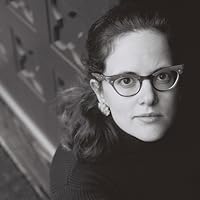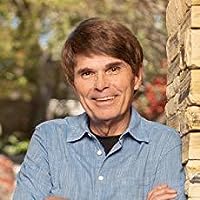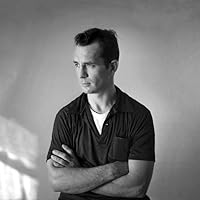Novelist Quotes
Quotes tagged as "novelist"
Showing 121-150 of 157

“At the heart of the novelist's craft lies an optimism which thinks that the knowledge we gather from our everyday experience, if given proper form, can become valuable knowledge about reality.”
― The Naive and the Sentimental Novelist
― The Naive and the Sentimental Novelist

“No matter how much enthusiasm and effort you put into writing, if you totally lack literary talent you can forget about being a novelist.”
― What I Talk About When I Talk About Running
― What I Talk About When I Talk About Running

“God is a novelist. He uses all sorts of literary devices: alliteration, assonance, rhyme, synecdoche, onomatopoeia. But of all of these, His favorite is foreshadowing. And that is what God was doing at the Cloisters and with Eudora Welty. He was foreshadowing. He was laying traps, leaving clues, clues I could have seen had I been perceptive enough.”
― Girl Meets God
― Girl Meets God

“On every page, confidence fights with self-doubt. Every sentence is an act of faith. Why would anybody want to do it?”
― The Successful Novelist: A Lifetime of Lessons about Writing and Publishing
― The Successful Novelist: A Lifetime of Lessons about Writing and Publishing

“Was the dividing line between life and fiction as hazy for other people as it was for a writer?”
― Mr. Murder
― Mr. Murder

“Reading is rapture (or if it isn't, I put the book down meaning to go on with it later, and escape out the side door).”
―
―

“A novelist is essentially a person who covers distance through his patience, slowly, like an ant. A novelist impresses us not by his demonic and romantic vision, but by his patience.”
―
―

“One has to be just a little crazy to write a great novel.
One must be capable of allowing the darkest, most ancient and shrewd parts of one's being to take over the work from time to time. Or be capable of cracking the door now and then to
the deep craziness of life itself—as when in Anna Karenina, Levin proposes to Kitty in the same weird way Tolstoy himself proposed to his wife. Strangeness is the one quality in fiction that cannot be faked.”
― On Becoming a Novelist
One must be capable of allowing the darkest, most ancient and shrewd parts of one's being to take over the work from time to time. Or be capable of cracking the door now and then to
the deep craziness of life itself—as when in Anna Karenina, Levin proposes to Kitty in the same weird way Tolstoy himself proposed to his wife. Strangeness is the one quality in fiction that cannot be faked.”
― On Becoming a Novelist

“I think there really is no other way to write a long, serious
novel. You work, shelve it for a while, work, shelve it again,
work some more, month after month, year after year, and then
one day you read the whole piece through and, so far as you
can see, there are no mistakes. (The minute it's published and
you read the printed book you see a thousand.) This tortuous
process is not necessary, I suspect, for the writing of a popular
novel in which the characters are not meant to have depth and complexity, where character A is consistently stingy and character
B is consistently openhearted and nobody is a mass of
contradictions, as are real human beings. But for a true novel
there is generally no substitute for slow, slow baking.
We've all heard the stories of Tolstoy's pains over Anna Karenina,
Jane Austen's over Emma, or even Dostoevsky's over Crime and Punishment, a novel he grieved at having to publish prematurely,though he had worked at it much longer than most popular-fiction writers work at their novels.”
― On Becoming a Novelist
novel. You work, shelve it for a while, work, shelve it again,
work some more, month after month, year after year, and then
one day you read the whole piece through and, so far as you
can see, there are no mistakes. (The minute it's published and
you read the printed book you see a thousand.) This tortuous
process is not necessary, I suspect, for the writing of a popular
novel in which the characters are not meant to have depth and complexity, where character A is consistently stingy and character
B is consistently openhearted and nobody is a mass of
contradictions, as are real human beings. But for a true novel
there is generally no substitute for slow, slow baking.
We've all heard the stories of Tolstoy's pains over Anna Karenina,
Jane Austen's over Emma, or even Dostoevsky's over Crime and Punishment, a novel he grieved at having to publish prematurely,though he had worked at it much longer than most popular-fiction writers work at their novels.”
― On Becoming a Novelist

“Nothing is sillier than the creative writing teacher's dictum
"Write about what you know." But whether you're writing
about people or dragons, your personal observation of how
things happen in the world—how character reveals itself—can
turn a dead scene into a vital one. Preliminary good advice
might be: Write as if you were a movie camera. Get exactly
what is there. All human beings see with astonishing accuracy,
not that they can necessarily write it down.”
― On Becoming a Novelist
"Write about what you know." But whether you're writing
about people or dragons, your personal observation of how
things happen in the world—how character reveals itself—can
turn a dead scene into a vital one. Preliminary good advice
might be: Write as if you were a movie camera. Get exactly
what is there. All human beings see with astonishing accuracy,
not that they can necessarily write it down.”
― On Becoming a Novelist

“The question one asks of the young writer who wants to
know if he's got what it takes is this: "Is writing novels what
you want to do? Really want to do?"
If the young writer answers, "Yes," then all one can say is:
Do it. In fact, he will anyway.”
― On Becoming a Novelist
know if he's got what it takes is this: "Is writing novels what
you want to do? Really want to do?"
If the young writer answers, "Yes," then all one can say is:
Do it. In fact, he will anyway.”
― On Becoming a Novelist

“...Cody is furiously explaining to his little son Tim 'Never let the right hand know what your left hand is doing'...
Page 100.”
― Big Sur
Page 100.”
― Big Sur

“People make interesting assumptions about the profession. The writer is a mysterious figure, wandering lonely as a cloud, fired by inspiration, or perhaps a cocktail or two.”
―
―

“On Twitter, people who had read my book followed me and I could see what else they were reading, why they'd liked what I'd written and by the by, more about them than I'd ever elicit from two minutes in a tent at a book festival, stuck behind a signing desk.”
―
―

“The thought of the novelist that matters most is the thought that makes him a novelist.
The thought of the novelist lies not in the remarks of his characters or even in their introspection but in the plight he has invented for his characters, in the juxtaposition of those characters and in the lifelike ramifications of the ensemble they make — their density, their substantiality, their lived existence actualized in all its nuanced particulars, is in fact his thought metabolized.
The thought of the writer lies in his choice of an aspect of reality previously unexamined in the way that he conducts an examination. The thought of the writer is embedded everywhere in the course of the novel’s action. The thought of the writer is figured invisibly in the elaborate pattern — in the newly emerging constellation of imagined things — that is the architecture of the book: what Aristotle called simply “the arrangement of the parts,” the “matter of size and order.” The thought of the novel is embodied in the moral focus of the novel. The tool with which the novelist thinks is the scrupulosity of his style. Here, in all this, lies whatever magnitude his thought may have.
The novel, then, is in itself his mental world. A novelist is not a tiny cog in the great wheel of human thought. He is a tiny cog in the great wheel of imaginative literature.”
―
The thought of the novelist lies not in the remarks of his characters or even in their introspection but in the plight he has invented for his characters, in the juxtaposition of those characters and in the lifelike ramifications of the ensemble they make — their density, their substantiality, their lived existence actualized in all its nuanced particulars, is in fact his thought metabolized.
The thought of the writer lies in his choice of an aspect of reality previously unexamined in the way that he conducts an examination. The thought of the writer is embedded everywhere in the course of the novel’s action. The thought of the writer is figured invisibly in the elaborate pattern — in the newly emerging constellation of imagined things — that is the architecture of the book: what Aristotle called simply “the arrangement of the parts,” the “matter of size and order.” The thought of the novel is embodied in the moral focus of the novel. The tool with which the novelist thinks is the scrupulosity of his style. Here, in all this, lies whatever magnitude his thought may have.
The novel, then, is in itself his mental world. A novelist is not a tiny cog in the great wheel of human thought. He is a tiny cog in the great wheel of imaginative literature.”
―

“Not writing is never an option. This is not words of advice. It's just literally never an option!”
―
―

“As a historical novelist, there is very little I like more than spending time sorting through boxes of old letters, diaries, maps, trinkets, and baubles.”
―
―

“I was asked the other day in which era I would choose to live. As a historical novelist, it comes up sometimes. As a woman I'd have to say I'd like to live in the future - I want to see where these centuries of change are leading us.”
―
―

“It is not so much as to say that something has occured; but to describe the very essence of the occurance. One must take hold of his readers and pull them into his world...the world that he has penned, with the utmost care and attentiveness.
And then, when the readers are fully submerged in this magnificently crafted place of wonder; they will see, and touch, and smell, and feel all the elements of the author's imagination.”
―
And then, when the readers are fully submerged in this magnificently crafted place of wonder; they will see, and touch, and smell, and feel all the elements of the author's imagination.”
―

“Being a novelist is not the sort of thing we can shut off. It infests every bit of us until we lose the boundary between Person and Writer, like one of those color charts where it is impossible to say where the blue stops and the red begins.”
―
―

“As a novelist it is my job to tell stories that inspire and entertain but I am increasingly mindful that many of these historical tales (which of themselves are fascinating) relate directly to our issues in society today.”
―
―

“I'm a professional writer and I consider it part of my job to publicise my work and these days part of that job is done online.”
―
―

“I spend a lot of time imagining things - in fact, you could say that imagining things is my job.”
―
―
All Quotes
|
My Quotes
|
Add A Quote
Browse By Tag
- Love Quotes 97k
- Life Quotes 75.5k
- Inspirational Quotes 72.5k
- Humor Quotes 43.5k
- Philosophy Quotes 29.5k
- Inspirational Quotes Quotes 27k
- God Quotes 26k
- Truth Quotes 23.5k
- Wisdom Quotes 23.5k
- Romance Quotes 23k
- Poetry Quotes 22k
- Death Quotes 20k
- Happiness Quotes 18.5k
- Life Lessons Quotes 18.5k
- Hope Quotes 18k
- Faith Quotes 18k
- Quotes Quotes 16.5k
- Inspiration Quotes 16.5k
- Spirituality Quotes 15k
- Religion Quotes 15k
- Motivational Quotes 15k
- Writing Quotes 14.5k
- Relationships Quotes 14.5k
- Life Quotes Quotes 14k
- Love Quotes Quotes 13.5k
- Success Quotes 13.5k
- Time Quotes 12.5k
- Motivation Quotes 12k
- Science Quotes 11.5k
- Knowledge Quotes 11k


